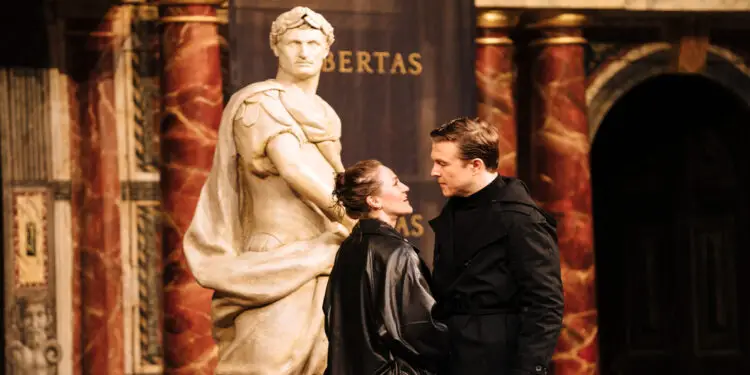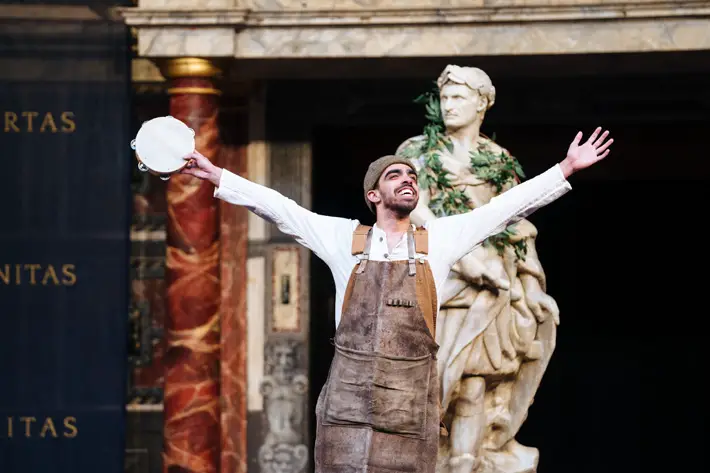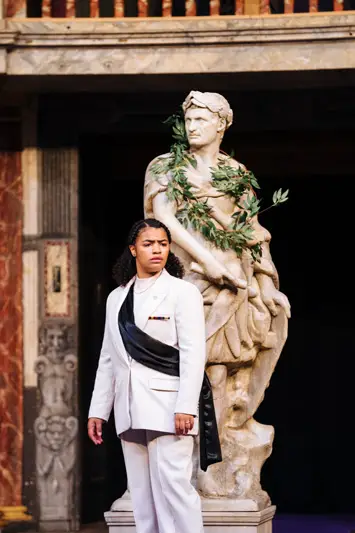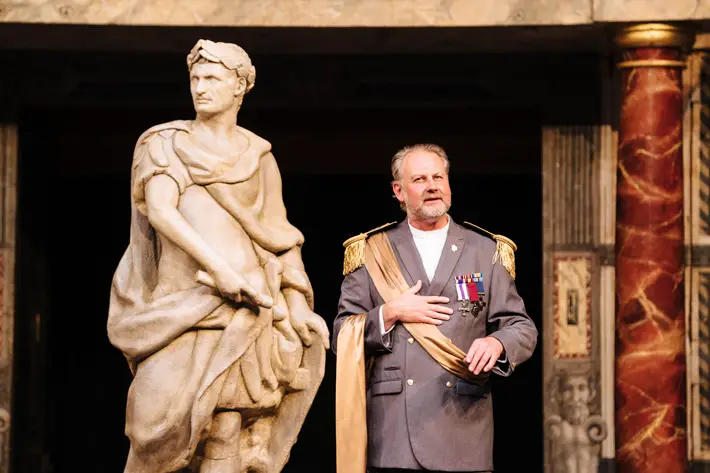Julius Caesar [Shakespeare’s Globe] – Review – York Theatre Royal

By Elizabeth Stanforth-Sharpe, June 2022
Shakespeare’s Julius Caesar was first performed in about 1599, at a time when Elizabeth I was drawing near to the end of her life, it was unclear who her successor would be and the country was in a dangerous state of political turmoil, the populace unsure of which leaders could be trusted; their senses of loyalty and duty thrown into complete confusion. Parallels with our contemporary world of ambition, incursion and revolution are difficult to avoid.
Indeed, as if to enforce the notion before the audience hears one word from the actors, the words of Brutus from Act 2, Scene 1 are writ large across the theatre programme of the Shakespeare’s Globe production of the play.
‘Th’abuse of greatness is when it disjoins remorse from power’.
Conspiracy to kill, public speeches of clever rhetoric, and a divisive fight for supremacy. Ancient Rome has never felt closer to home.
The touring production of Julius Caesar, directed by Diane Page, winner of the 2021 JMK Award, had played at three wonderful outdoor venues prior to arriving at York – the Festival at Hay on Wye, in the gardens of the Mansion House at Calderstones Park, and against the gorgeous Elizabethan backdrop of Doddington Hall – completed only one year after the first production of the play. Three magnificent spaces that allowed the cast members to use their full vocal range, wander freely amongst their audience members and interact on a personal reaction basis with individuals.
“Loyaties shifted”
York Theatre Royal was the first performance in an enclosed theatre location, where engagement with an audience sat in awkward rows was limited, acoustic characteristics were different, and the natural elements of sky, trees and unpredictable weather were bounded by a very solid theatre roof. To capture a sense of environmental expanse, the house lights were kept up throughout the play, and what the piece lost in the dynamics unique to open-air theatre it gained in a very lovely intimacy of synergy between stage and audience.
The set, designed by Khadija Raza, was, on the surface of it, a simple one, but it succinctly echoed the meeting place of the Roman Senate, a statue mid stage, flanked by two banners declaring, ‘Libertas, Dignitas, Veritas’ – ‘Freedom, Dignity, Truth’, and was all that was necessary for an examination over the two regimes of Republic and Empire to unfold. The audience members were drawn into the scene as citizens of Rome and witnesses to the events by the cobbler, who encouraged the assembly in a pantomimic exchange of words in disdain of Caesar.
The monochromatic colour coding of the costumes was fascinating. The black signified Caesar’s followers, the white the devotees of Brutus, but most wore elements of both, adding to the sense of subterfuge and confusion. Who could be trusted, and who would betray? Sashes and jackets imperceptibly disappeared and reappeared as loyalties shifted, and what of those who flouted the coding altogether?
“Measured”
The events of Julius Caesar took place 2065 years ago, a time when women had no public voice, and yet the evidence tells us that Mark Antony’s wife Fulvia exerted an enormous influence in orchestrating Antony’s response to Caesar’s murder; an injustice that resonates throughout history as women struggle to be recognised in roles of power and politics, still encountering glass ceilings in work progression, barriers through childcare and lack of access to maternity leave, and the prejudices of those who would rather rarefy them for their choice of dress than applaud their sound leadership. Page’s enquiry into the play turns this on its head. Brutus, a republic senator and Cassius, a skilled General and a senator, are both portrayed magnificently by women; Anna Crichlow and Charlotte Bate respectively. The exchanges of Act 4 particularly, a highlight moment of this performance, emphasises the pull of emotions and loyalties that accompany those in the public eye as friendships must be side-lined, personal bereavements downplayed, and the free will subjugated by fate and position; somehow seeming all the more poignant from a female viewpoint. Brutus’ was seen to be a person of grace, philosophical mindset and deep reflection.
However, this production is not simply keen to point out the disparities of gender imbalance. The show has been three years in the making – a period of time in our own history that, on many levels, has been unprecedented, and Page looks at our political landscape by also addressing the issues of race, class and violence. Caesar, a man, is white. Brutus, a woman, is black. The cobbler put down as a mere labourer, doubles as Decius, the conspirator who uses clever guile to lead Caesar into the hands of his murderers. And perhaps most significantly, there is a change to the text at the end. It would have been wrong for Brutus to be murdered at the hands of white men, and the question is posed, “Is it ever right to meet violence with violence, or is there another way forward?”
The first half inevitably moved slower than the second, as unrest after the victory of Caesar began to build, but there was something very clever and honestly on-point in the way it began, with disparate flat, quiet murmurings and complaints from the few, that then crescendoed as dissension grew. It felt measured and intelligently thought through. Jesse Haughton-Shaw was the dramaturg for the production, and it was very evident that there had been a great deal of work done on the implications of the text before rehearsals even began. The cast was small but mightily formed. Charlotte Bate was a splendid Cassius, veering between petulance, neediness, argumentative ill temper and occasional bouts of leadership potential. Omar Bynon displayed twinkle-eyed charm in all his roles and was a real delight to watch. Anna Critchlow was an authoritative and believable Brutus who carried much of the weight of Page’s vision for the play on her shoulders.
“Relatable”
Amie Frances, as Calpurnia, played a very lovely and engaging wife for Caesar, humanising him, recognising that he was in danger but also aware that she could not keep him from his duty, whilst being an important reminder of the traditional perception of how women should behave as presented throughout history. Cash Holland, making a very creditable debut with Shakespeare’s Globe, embodied Portia as the other commonly mis-held view of a woman’s persona; emotional, given to hysterics and prone to over-react. Jack Myers admirably played Casca, Octavius and a number of other roles; I particularly enjoyed seeing him as Lucius, the exhausted put-upon servant.
Samuel Oatley’s mastery of Antony’s speech of Act 3 was one of the stand out points in the play. Dickon Tyrell is a seasoned Globe actor and educator, and his portrayal of Caesar as a man who doesn’t appear to be unduly power-hungry, can’t separate his private life from his public one, but is beguiled by the adulation of the populace to the point where he ignores the warning signs that are there, believing himself to invincible, was shrewdly grasped.
A cast of eight actors may have seemed sparse at times, but the material unpacked in this pared down staging of Julius Caesar was mesmerising. The power of public opinion; the overturning of statues; the presence of candidates that we think are cartoons; the ones who crept unseen into the limelight; the ones we should be afraid of; societal treatment of women, race, tradition and positions of power; the language of violence, and the assessment of how our inherited history has shaped our values and perceptions of people based upon their race, gender or class. It was a performance that revolved around historical events of over two thousand years ago, and yet, every word was relatable to the contemporary world, and I shall be weighing some of its implications, thoughts and questions for some time to come.
Ongoing tour dates for Shakespeare’s Globe Julius Caesar can be viewed here – shakespearesglobe.com
images: Helen Murray










